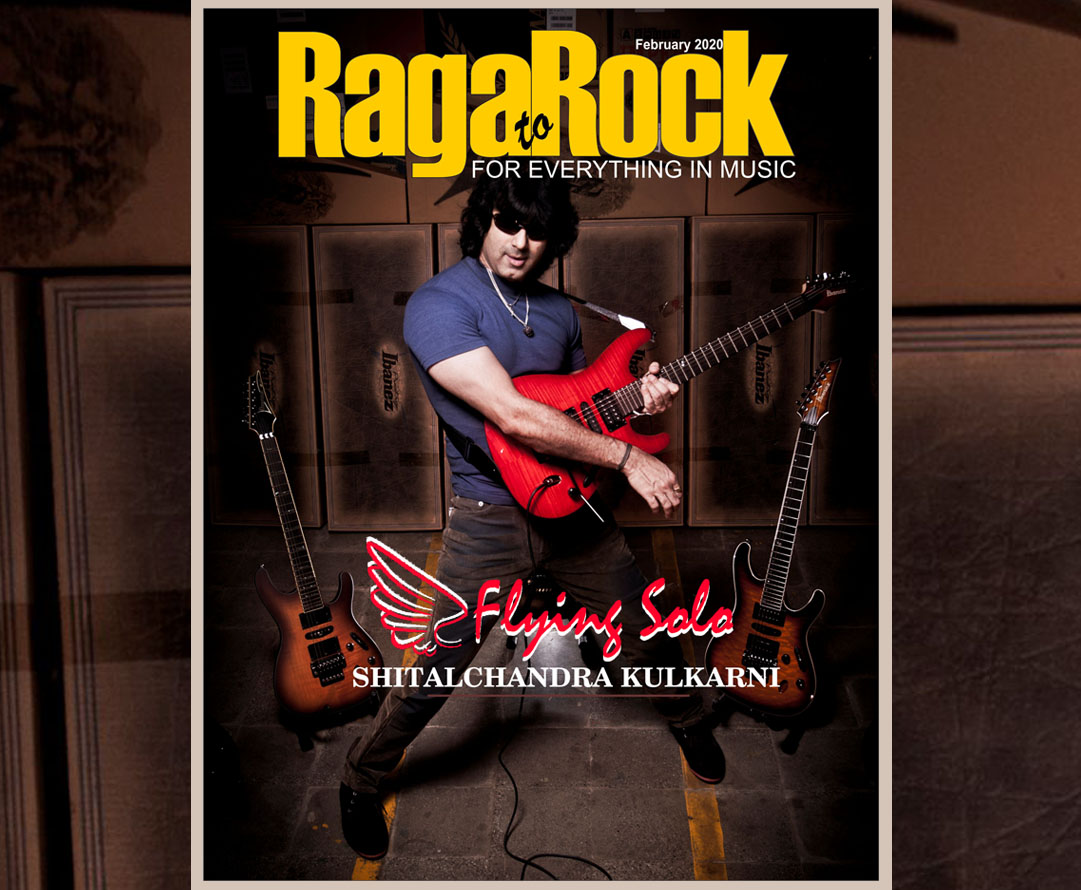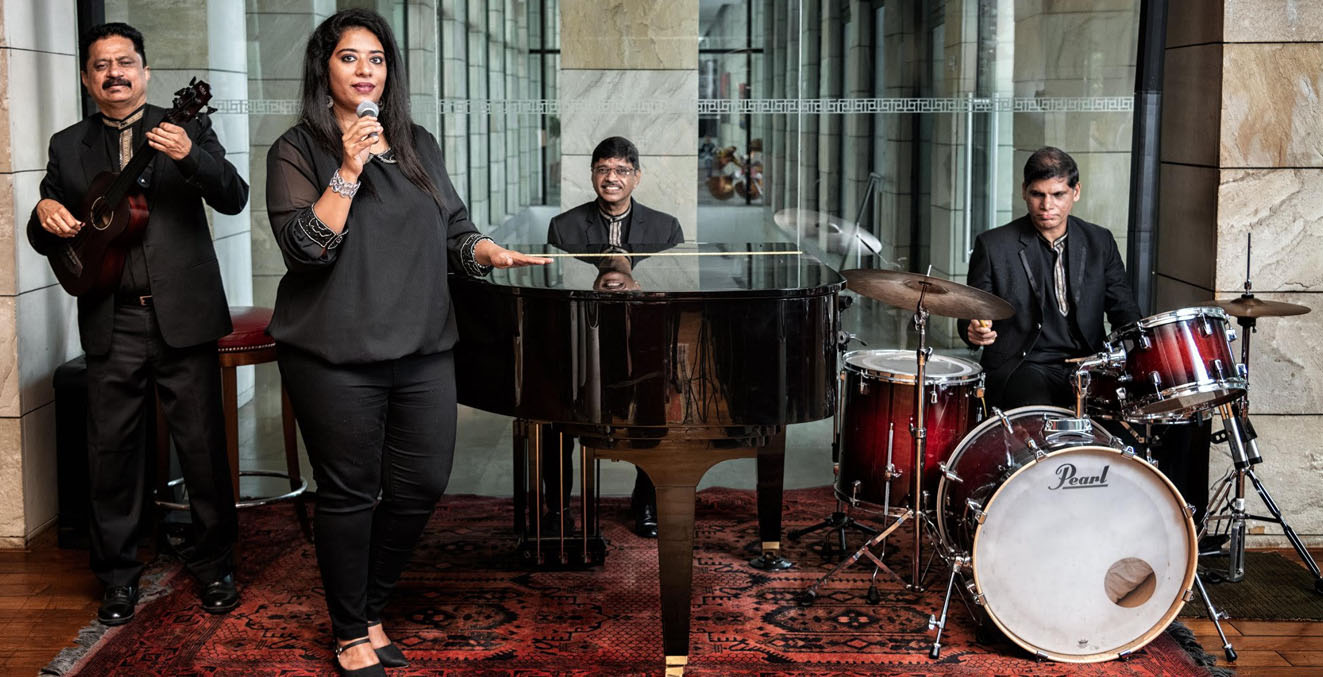ANNIVERSARIES:

One of India’s leading guitarists, Shitalchandra Kulkarni is the front man of renowned rock band, Tungstn and brand ambassador for Ibanez Guitars. Over the past three decades he has been a composer, producer, performer and teacher with body of work including live gigs, albums and various projects ranging from personal, to festivals, films and corporate events.
He recently released his first solo album titled, Endless, which is a bold departure from the conventional in that it is a completely instrumental one. It is also a testament of Shital’s self confidence and belief in his ability to hold the interest of his fans and audience.
Shital picked up his first guitar at the age of five and fell in love with the instrument and over the years his favourite guitar has been Ibanez. His first band Tallfathins won the all India Live Wire band contest at the IIT Mumbai Festival in 1990 and his second band Tungsten, later Tungstn with trimmed lineup, brought out two albums – the first a self titled double album and the second titled, Jumpstart.
Shitalchandra is an ex music faculty at Flame University and he also runs the Institute of Modern Music, which was founded by his father Suhaaschandra Kulkarni a well known accordionist, back in 1965. He set up his own studio, Chords India, in the early 90s and worked on over 400 commercial titles but for some years now he has been using it for only his personal projects.
Here Shitalchandra Kulkarni talks to Ragatorock in this indepth interview, about his passion for the guitar, the independent music scene and his musical journey through the past three decades.
When did you decide to be a Musician?
I had a musical background and I came from a musical family. My father is a professional musician. His principal instrument is Accordion, and music was always in the family, and from the time I started understanding that I am completely drawn towards creativity and playing, music is what I decided I want to dedicate my life to.
If I have to go way back, I started learning the guitar when I was in 5th standard, performing for school gatherings, competitions, imitating label songs was my first ladder, that which I continued for few years and this initial learning, studying, progressing years gave me an insight that I am meant to be full time in music- in all departments.
Tell us of your style of Guitar playing? Your favorite Guitar players & influences in your music?
It is very difficult to self analyze my playing, I have never done that, I always followed my instincts and spontaneity than the technique but of course I tried to polish my skills and playing techniques, and handling the instruments from the sound perspective is of utmost importance to me, and the way it is heard.
Guitar, as an instrument has various styles and has been improvised by various players. Imitating is fine initially, but finally the player grows only when he imitates himself and that’s exactly what I have tried to do over the years. Trying to imitate what plays in my head and unfortunately after playing for decades I have still not being able to achieve that.
But yes like all guitarists I do have my influences which start way back from my school time.
To name a few, Ritchie Blackmore, Eddie van Halen, Paul Gilbert, Steve Vai, Steve Lukathuar, R.D.Burman, Yanni to name a few.
Tell us about your latest Album?
My new project, a instrumental guitar album is called ENDLESS. This album is going to be released by songdew.com in three parts over the next one year. The first part consisting of six tracks has just been released last month.
Its a new thought I feel of replacing vocal by instrumental notes and improvisation. Every track is shaped with a fixed composition with a canvas of production giving the listeners a surprise elements everytime they listen. Every track has been thought with some context keeping a certain vision and emotion in mind. For example -
Super Ride talks about a drive , about a skilful ride,
Dark Street- talks about anxiety to fear to rise,
Run For Cover- talks about speed and chase,
Water- different expressions of water in classical manner,
Take Me Through- Chemistry between guitar and EDM,
Beat The Heat- Full on groovy and rock and roll.
The entire album's composition, production, sound design, and playing is done by me taking the support of my two ace engineers Mr. Gaurav Korgaonkar for music synthesis and Mr. Shridhar Deshpande who recorded all guitars and mixed the album.
The album was mastered by Mr. San Page at Page Productions. The entire album is recorded and mixed in my studios - Chords India, Pune.
ENDLESS is an album which will redefine instrumental music and people who even don't listen to instrumental music or guitar oriented music can also enjoy this project.
Why did you want to make an instrumental album?
I was always vocal composition oriented person, right from the beginning of my career, I always did vocal music where guitar played the role of accompaniment but parallelly I always thought that the way I handled my instrument, I could do more than just the supportive role. Instrumental music, instrumental pieces, colouring the pieces or the solos was always my parallel musicianship, that made me write lot of instrumental germs as scratches which eventually I have produced them to some extent in ENDLESS. I always wanted to do an instrumental act where I could get the freedom of play but discipline of composition and that was my main drive to do instrumental project.
While being a full time musician how did you manage all your other activities?
Well that's a good question because managing domestic and professional life is always a challenge Though I am full time into music I always worked for myself and on four fronts, Teaching, Studio work, Music Faculty at FLAME UNIVERSITY, and Personal projects.
Finding time, making time, giving priority, forming an Agenda, financial aspects and food, to creativity doing a balance of all this, is always tough. Still since I call myself a professional musician I have always tried to streamline all my musical responsibilities backed-up with musical academics and my personal life too.
Sure...not that I was 100% successful, but yes with few highs and lows.
Tell us about your studio and institute?
My institute - INSTITUTE OF MODERN MUSIC was started by my father Suhaaschandra Kulkarni way back in 1965. We have a huge curriculum of 5 grades per instrument backed-up with certain syllabus for every grade right from the base to advance level. We are teaching guitar, mandolin, piano, keyboard, accordion and drums and we have a very specific system of teaching every student individually and each student is given separate scientific training - right from scratch.
For more information on institute please check the site - www.instituteofmodernmusic.in
And do check the youtube channel for the way the students are trained.
My Studio - CHORDS INDIA is basically designed and equipped now to do my home productions and my home work. I started my studio way back in the early 90s and did commercial work for more than 400 titles till 2007 and since then this Studio is used only for my work. My studio is equipped with a lot of Analog and Digital and DAW systems to see to that I can capture the sound which sounds right to my ears.
Share your journey from Tungztn days?
It was a combination of struggle and party time for about more than 15 years. We released our debut twin album called TUNGZSTEN in 2000, followed by multiple concerts, serious ups and downs, change of line ups, change of thought and pattern of music till 2007. In 2007 renamed the band as - TUNGZTN with a trimmed tight trio line up. Worked on new material for the next 2 years, followed by 2 more years recording the material in the studios… released the album - JUMPSTART in 2013 and disbanded in December 2015, before releasing our first Hindi single SOCHNA MANA HAI. This was the story of Tungztn with a span of 15 years, in short.
What do you think of the independent music scene in India?
If you ask me, independent music, indie artist or bands have always been through their struggle and tough times to show their existence. Its been a debate over the years that the so called Independent music scene is improving, is promising, is more engaging but according to me I really never understood all this because except the few artist here and there most of the artist had a rough ride and tried hard for the ends to meet, because other than Bollywood Music Industry there is no other revenue building music industry which gives a concrete platform to display skills and art and compositions which can be a mode of survival.
Hobby is different but settlement and getting repaid for your passion and fire is different.
Until and unless people and powers recognize the need to display the skills of independent artist in the coming years, the acceptance is not going to build and in turn give it a status of an industry.
What is your advice to young and upcoming artistes?
Imitation is ok to begin with but be yourself and get married to your own emotions and skills to display your creativity.
Where do you see yourself 10 years from now?
More settled, more watched, more heard, more followed, more earned...hahahopefully to see a bigger recognized Indian independent music industry.

Those of you who have been around from the 1960's through the 1990's will remember the vibrant live music scene in almost every starred hotel in India. Those were the days when you walked into a nightclub like 'Rendezvous' at The Taj Mahal hotel and 'Supper Club' at the Oberoi Sheraton in Mumbai to see curtains going up on a band that was the prime focus of these outlets. Every seat in these restaurants allowed an unobstructed view of the band that performed every night on resident contracts. Today all this has disappeared thanks to some ridiculously high entertainment taxes on live music. Today, non off these hotels have complete bands playing save for a few that feature small duos or solo singers. The Lodhi in New Delhi, recently listed among the world's best hotels, decided to step in and rewind to the good old days. They got Goa's premier jazz quartet 'Jazz Junction' to move to Delhi on a resident contract and the decision has paid off in terms of footfalls generated by the band. Jazz Junction featuring singer Daniella Rodrigues, pianist Tony Dias,
bassist Colin D'Cruz and drummer Angelo Colasco began playing at The Lodhi in June 2018. Four months into the contract the band generated a sizeable following, with quite a few high profile guests choosing to celebrate their special occasion at the Elan bar where the band performs. Against all odds the rewind option proved to be a huge success and hopefully other properties around the country takes the cue to trigger a whole new revival of live music.